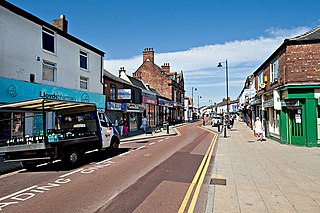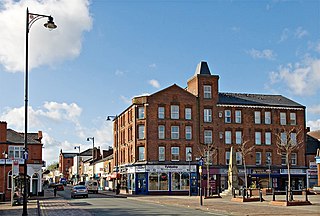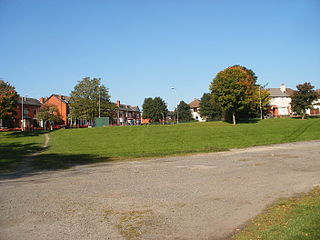Related Research Articles

The Metropolitan Borough of Wigan is a metropolitan borough of Greater Manchester, in North West England. It is named after the main settlement of Wigan. It covers the towns of Atherton, Ashton-in-Makerfield, Golborne, Hindley, Ince-in-Makerfield, Leigh and Tyldesley. The borough also covers the villages and suburbs of Abram, Aspull, Astley, Bryn, Hindley Green, Lowton, Mosley Common, Orrell, Pemberton, Shevington, Standish, Winstanley and Worsley Mesnes. The borough is also the second-most populous district in Greater Manchester.

Atherton is a town in the Metropolitan Borough of Wigan, in Greater Manchester, England and historically a part of Lancashire. The town, including Hindsford, Howe Bridge and Hag Fold, is 5 miles (8.0 km) south of Bolton, 6.5 miles (10.5 km) east of Wigan, and 10 miles (16.1 km) northwest of Manchester. From the 17th century, for about 300 years, Atherton was known as Chowbent, which was frequently shortened to Bent, the town's old nickname.

Astley is a village in the Metropolitan Borough of Wigan, Greater Manchester, England. Within the boundaries of the historic county of Lancashire, it is crossed by the Bridgewater Canal and the A580 East Lancashire Road. Continuous with Tyldesley, it is equidistant from Wigan and Manchester, both 8.3 miles (13.4 km) away. Astley Mosley Common ward had a population of 11,270 at the 2011 Census.

Tyldesley is a town in the Metropolitan Borough of Wigan in Greater Manchester, England. Within the boundaries of the historic county of Lancashire, it is north of Chat Moss near the foothills of the West Pennine Moors, 7.7 miles (12.4 km) southeast of Wigan and 8.9 miles (14.3 km) northwest of Manchester. At the United Kingdom Census 2001, the Tyldesley built-up area, excluding Shakerley, had a population of 16,142.
John Allen Parkinson was a British Labour Party politician and former coal miner. He stood for Parliament seven times and was overwhelmingly elected each time.

Henry Twist was a British miner's agent and Labour politician.

Shakerley is a suburb of Tyldesley in the Metropolitan Borough of Wigan, Greater Manchester, England. It was anciently a hamlet in the northwest of the township of Tyldesley cum Shakerley, in the ancient parish of Leigh. The boundary between Shakerley and Hindsford is the Hindsford Brook. It remains the boundary between Tyldesley and Atherton. Hyndforth Bridge across the brook, was rebuilt in stone in 1629.

Tyldesley cum Shakerley Urban District and its successor Tyldesley Urban District was, from 1894 to 1974, a local government district in Lancashire, England.

The Lancashire Coalfield in North West England was an important British coalfield. Its coal seams were formed from the vegetation of tropical swampy forests in the Carboniferous period over 300 million years ago.
The Astley and Tyldesley Collieries Company formed in 1900 owned coal mines on the Lancashire Coalfield south of the railway in Astley and Tyldesley, then in the historic county of Lancashire, England. The company became part of Manchester Collieries in 1929 and some of its collieries were nationalised in 1947.
Tyldesley Coal Company was a coal mining company formed in 1870 in Tyldesley, on the Manchester Coalfield in the historic county of Lancashire, England that had its origins in Yew Tree Colliery, the location for a mining disaster that killed 25 men and boys in 1858.
The Lancashire and Cheshire Miners' Federation (LCMF) was a trade union that operated on the Lancashire Coalfield in North West England from 1881 until it became the Lancashire area of the National Union of Mineworkers in 1945.

Guy Rowson was a British Labour Party politician who served as the Member of Parliament (MP) for Farnworth in Lancashire. He was elected in 1929, defeated in 1931, and re-elected in 1935, until his death in 1937. He was Parliamentary Private Secretary to the then Labour leader of the opposition, Clement Attlee. In 1936, he was responsible for the introduction of the Annual Holiday Bill, which regulated holiday pay for workers.
Thomas Aspinwall was a British trade unionist.
William Pickard was a British trade unionist.
The Lancashire and Cheshire Miners Permanent Relief Society (LCMPRS) was a form of friendly society started in 1872 to provide financial assistance to miners who were unable to work after being injured in industrial accidents in collieries on the Lancashire Coalfield. It also provided funds for widows, orphans and dependent relatives of those who were killed in the pits. The society operated until 2006 from offices in Wigan.
The Tyldesley Miners' Association represented coal miners in parts of Lancashire, in England.
References
Citations
- ↑ "Death of Mr Robert Isherwood a well known miners' agent", Wigan Observer and District Advertiser, British Newspaper Archive via Findmypast, 6 January 1905, retrieved 26 November 2017(subscription required)
- 1 2 "Mr Robert Isherwood", Leigh Chronicle and Weekly District Advertiser, British Newspaper Archive via Findmypast, 10 April 1903, retrieved 26 November 2017(subscription required)
- ↑ Lunn 1953, p. 126.
- ↑ Tyldesley Urban District, Wigan Council, retrieved 26 November 2017
- ↑ "The late Mr Isherwood J.P.", Wigan Observer and District Advertiser, British Newspaper Archive via Findmypast, 11 January 1905, retrieved 26 November 2017(subscription required)
- ↑ "A Miners' Memorial", Northern Daily Telegraph, British Newspaper Archive via Findmypast, 30 April 1906, retrieved 26 November 2017(subscription required)
Bibliography
- Lunn, John (1953), A Short History of the Township of Tyldesley, Tyldesley Urban District Council